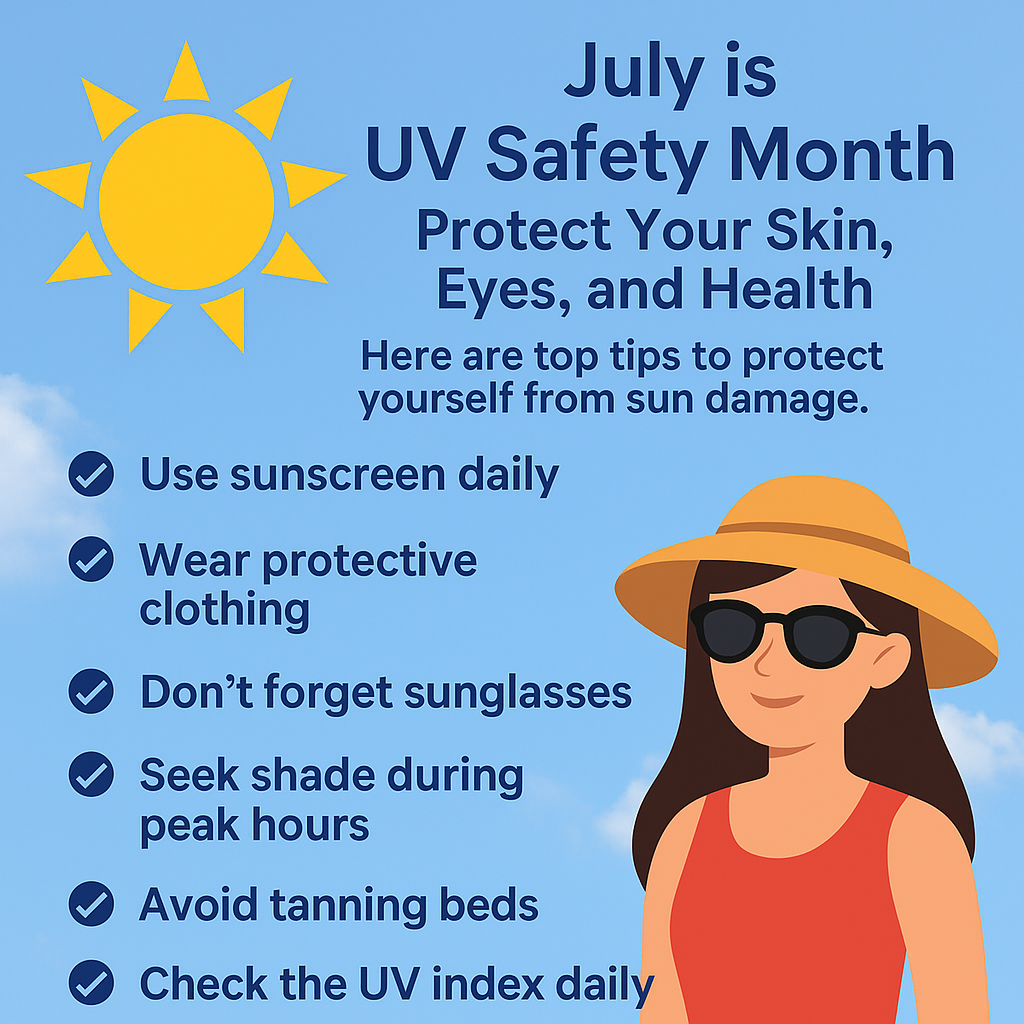🔬 Why is UV Safety So Important?
Skin Cancer is the Most Common Cancer in the U.S.
According to the CDC, more than 5 million cases of skin cancer are diagnosed each year in the United States, making it the most common cancer nationwide. Exposure to UV radiation is the primary cause.
The American Cancer Society reports that basal cell carcinoma and squamous cell carcinoma, both nonmelanoma skin cancers, are highly treatable if detected early. However, melanoma, a more dangerous skin cancer, can spread quickly to other parts of the body if not caught early.
UV Damage is Cumulative
The skin remembers every sunburn. UV exposure damages the DNA in your skin cells, and over time, these small damages accumulate, increasing your risk of cancer and accelerating aging.
Even one blistering sunburn during childhood or adolescence doubles your chances of developing melanoma later in life.
UV Radiation Affects Your Eyes Too
Exposure to UV rays can also cause eye problems such as:
-
Cataracts (clouding of the eye lens, leading to vision loss)
-
Macular degeneration (damage to the retina, leading to loss of central vision)
-
Photokeratitis (sunburn of the cornea, causing pain and temporary vision loss)
Wearing sunglasses that block 100% UVA and UVB rays is crucial for eye health.
📝 Who is Most at Risk from UV Exposure?
Anyone can experience damage from UV rays, but certain groups are at higher risk, including:
-
People with fair skin, light eyes, and light hair
-
Individuals with a history of sunburns
-
Those who spend long hours outdoors for work or recreation
-
Individuals living at high altitudes or near the equator, where UV exposure is stronger
-
Children and teens, as their skin is more sensitive

🛡️ Top Tips for UV Safety This Summer
✅ 1. Use Sunscreen Daily
-
Apply a broad-spectrum sunscreen with an SPF of at least 30. Broad-spectrum protects against both UVA and UVB rays.
-
Apply generously to all exposed skin, including ears, neck, and feet.
-
Reapply every two hours, or sooner if swimming or sweating.
✅ 2. Wear Protective Clothing
-
Opt for long-sleeved shirts and pants made from tightly woven fabrics.
-
Wear a wide-brimmed hat to protect your face, ears, and neck.
-
Consider clothing with an Ultraviolet Protection Factor (UPF) rating for additional protection.
✅ 3. Don’t Forget Sunglasses
-
Choose sunglasses that block 100% UVA and UVB rays.
-
Wrap-around styles provide the best protection as they limit rays entering from the side.
✅ 4. Seek Shade During Peak Hours
-
UV rays are strongest between 10 AM and 4 PM.
-
Whenever possible, stay under shade structures, trees, or use an umbrella when outdoors for extended periods.
✅ 5. Avoid Tanning Beds
-
Tanning beds emit UVA and UVB radiation, increasing your risk of skin cancer and premature aging. There is no such thing as a “safe tan.”
✅ 6. Check the UV Index Daily
-
The UV Index predicts the strength of UV rays each day. A higher index means a greater risk of harm from unprotected sun exposure.
-
Check local weather apps or the EPA website for daily UV index updates.
👶 Special Considerations for Children
Children’s skin is more sensitive to UV rays. Protecting them now reduces their risk of skin cancer later in life.
-
Use sunscreen on children over 6 months old. For babies younger than 6 months, keep them out of direct sunlight and dress them in protective clothing and hats.
-
Teach children sun safety habits early to create lifelong protective behaviors.
👩⚕️ When Should You See a Provider?
Early detection of skin changes saves lives. You should schedule a skin check if you notice:
-
A new mole or growth
-
Changes in the size, shape, or color of existing moles
-
Sores that don’t heal
-
Spots that itch, bleed, or become painful
Regular skin exams by a healthcare provider, along with self-exams every month, are key to early diagnosis and treatment.
💙 PHC is Here for Your Whole Health
At PHC, we care about your long-term health and well-being. Our providers are here to answer your questions about UV safety, skin health, and preventive care to keep you living confidently every day.
Book your appointment today:
📞 Call us at (727) 322-1054
🌐 Visit www.phcpinellas.com
🌐 Or Book Here
✨ Final Thoughts
UV Safety Month is a reminder that small daily habits can make a big difference in your health. Protecting your skin and eyes from harmful rays not only reduces cancer risks but keeps you looking and feeling your best for years to come.
Stay safe in the sun this summer — your future self will thank you.
